The convicts in the gruesome Nirbhaya rape incident are to be executed on 01 February 2020. As per NCRB data, close to 2500 death penalties were awarded since 2000. However, only 4 persons were executed during this period.
After more than seven years since the horrific Nirbhaya incident in the national capital, the four convicts have been issued death warrants and are due to be executed (hanged) on 01 February 2020. The imminent execution of these convicts has once again triggered the debate around capital punishment as a deterrent.
Data from one of NCRB’s annual reports, the ‘Prison Statistics India’ suggests that around four hundred prisoners in Indian jails, by end of 2018, were those who were awarded capital punishment.
186 sentenced to capital punishment in 2018
In 2018 alone, 186 persons were awarded capital punishment in the country. Of this, 26 were reported from Madhya Pradesh, 25 from Uttar Pradesh, and Jharkhand & Maharashtra reported 20 each. These four states alone account for 49% of the total capital punishments awarded in 2018. While 5 states and Delhi reported one each, nine states including Andhra Pradesh, Telangana, Sikkim, Nagaland, Meghalaya, Mizoram, Arunachal Pradesh, Goa, and Jammu and Kashmir reported zero capital punishments in 2018.
Death sentence of 65 convicts commuted to life imprisonment with Bihar leading the way
Commutation of a death sentence is done based on provisions under IPC & CrPC by the appropriate government. This is covered under Section 54 of the IPC and Section 432, 433 and 433A of the CrPC. Moreover, the convict can also file a mercy petition, decision on which is the discretion of the President of India or the respective State Governor as per Articles 72 and 161 (exercise of clemency) of the Constitution.
However, the death sentence of 65 convicts was commuted to life imprisonment in 2018. Bihar reported 12 such cases (18.5%), Madhya Pradesh reported 11 (16.9%) and Rajasthan reported 10 cases (15.4%). Together, these states accounted for almost 51% such cases.
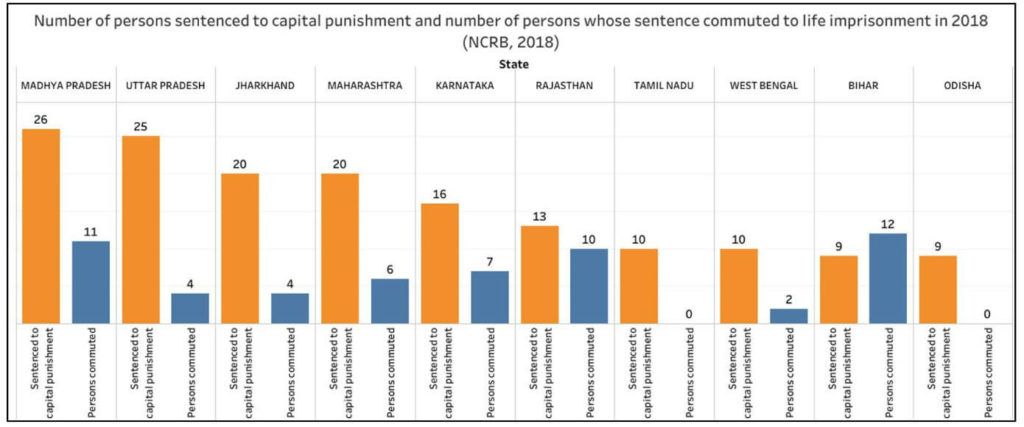
402 prisoners in India are those awaiting death sentence and 19% of them are in Maharashtra
In addition to the 186 persons sentenced to death in 2018, there were 206 prisoners convicted in previous years and awarded death penalty, thereby resulting in a total of 402 prisoners serving capital punishment or death penalty. These convicts accounted for 0.3% of the total convicts behind the bars in India in 2018.
76 (18.9%) out of 402 convicts sentenced with capital punishment were lodged in the prisons in Maharashtra. Uttar Pradesh (10.9%) accounted for the second highest number of such convicts followed by Madhya Pradesh (10%). Though as per the report, West Bengal had 37 such convicts amounting to 9.2% of the national total, it should be noted that data furnished in 2017 was used in the report for West Bengal since 2018 data was not submitted.
The report also makes it clear that no one was executed in 2018.
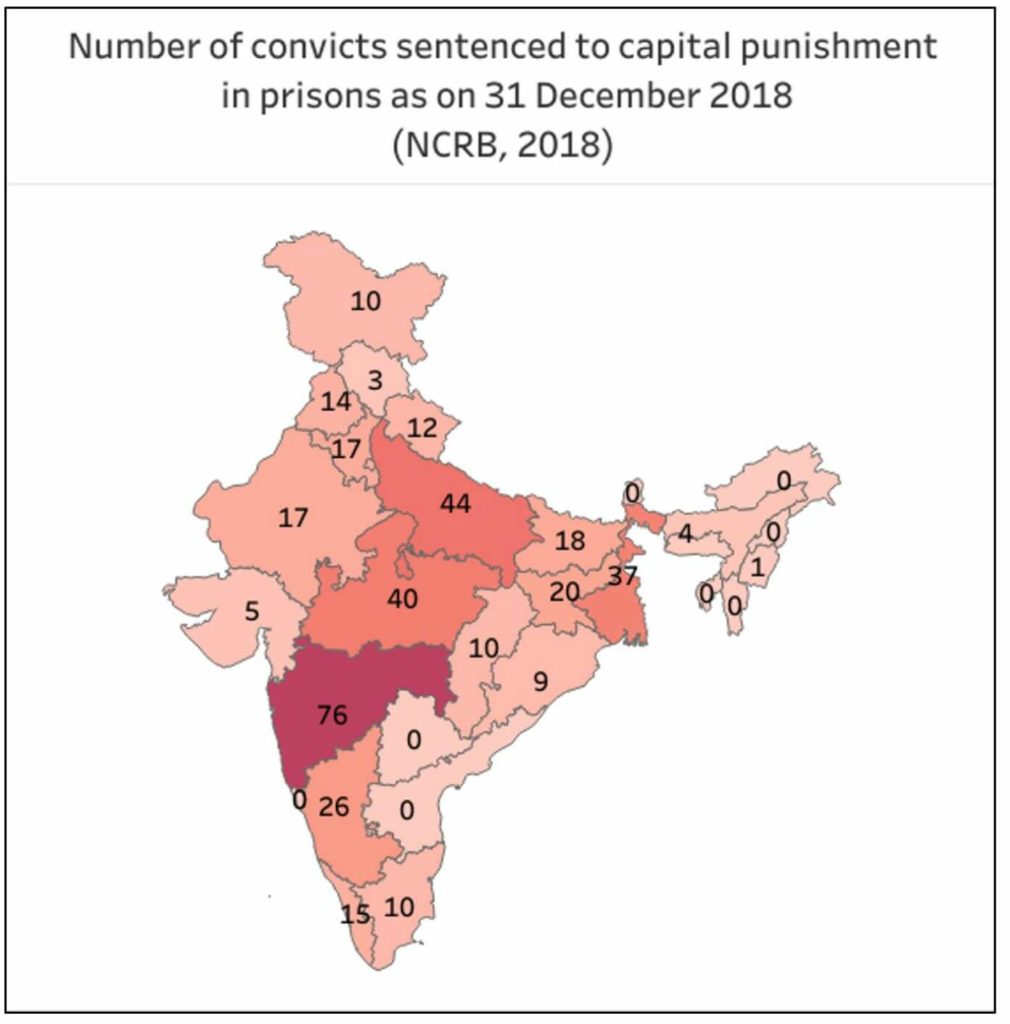
Of 2493 people awarded capital punishment since 2000, only four have been executed till date
Since the beginning of this millennium, while a total of 2493 persons were awarded capital punishment, only four executions have taken place in India-Dhananjoy Chatterjee in 2004, Ajmal Kasab in 2012, Afzal Guru in 2013 and Yakub Memon in 2015. Four convicts in the Nirbhaya case are set to be hanged on 01 February 2020 at Tihar Jail.
About 131 persons sentenced to capital punishment every year
On average, around 131 persons are sentenced to capital punishment by courts in India annually. Although the numbers are fluctuating, the years 2007 and 2018 witnessed the maximum number of capital punishments in the last 19 years with 186 cases each. The year 2014 had the least number of such cases.
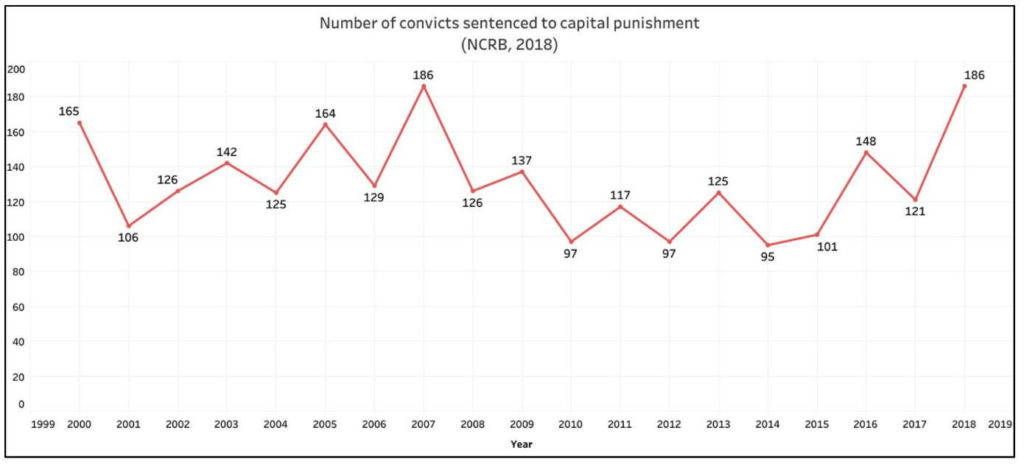
Delhi accounted for 76% of capital punishment commuted between 2005 to 2007
During the period from 2005 to 2007, an unusual surge was observed in the commutation of death sentence. There is no additional information on such a spike during these years.
In 2005, 74% or 919 out of 1241 commutations were reported in Delhi. Further, 117 cases from UP (9.4%) and 132 cases from Jharkhand (10.6%) were also reported in the same year.
In the following year, 2006, Delhi accounted for 79% of the cases (806 out of 1020) and in 2007 as well, Delhi accounted for 82.4% (726 out of 881).
Apart from these three years, the number of commutations in each year was either less than 100 or slightly more than 100.
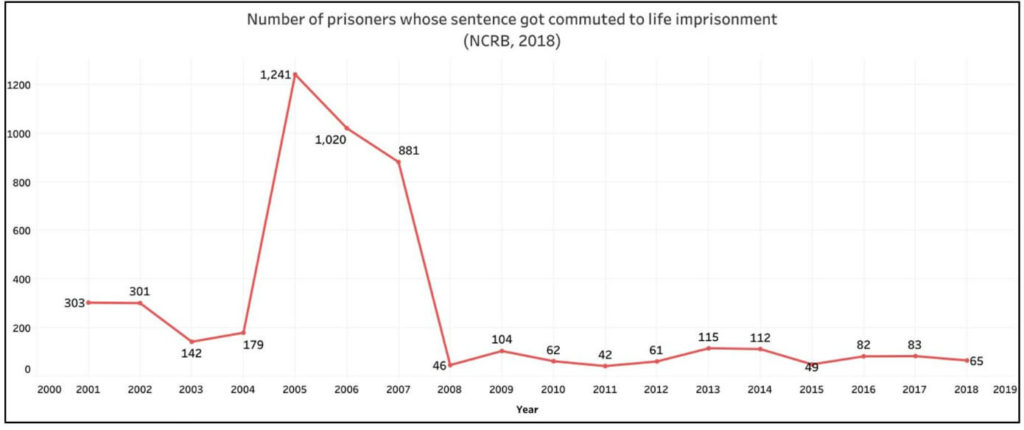
Huge disparities among States
There are huge state-wise disparities in the award of capital punishment. Five states alone account for more than half the number of cases reported across the country.
Bihar, Karnataka, Madhya Pradesh, Maharashtra and Uttar Pradesh are five states that have reported a substantially higher number of convictions resulting in capital punishment as compared to the remaining states in 2018.
23% of the Capital Punishments were awarded in Uttar Pradesh
Uttar Pradesh has been consistently reporting a large number of people being sentenced to death. A total of 285 death sentences out of 1,224 in the last ten years were reported from Uttar Pradesh alone which is around 23% of the total number. Maharashtra reported 111 sentences, Madhya Pradesh reported 115 and Bihar reported 107 such instances. Together, the five states accounted for 55.3% of the cases (677 out of 1224) in the last 10 years.
More than half the Commutations reported from 5 States
Since 2009, Bihar had reported the maximum number of commutations with 137 out of total 775 (17.6%). Uttar Pradesh was next in line with 13.8% (107). Karnataka (53), Madhya Pradesh (87) and Maharashtra (56) together reported 196 cases, amounting to a quarter of the total.
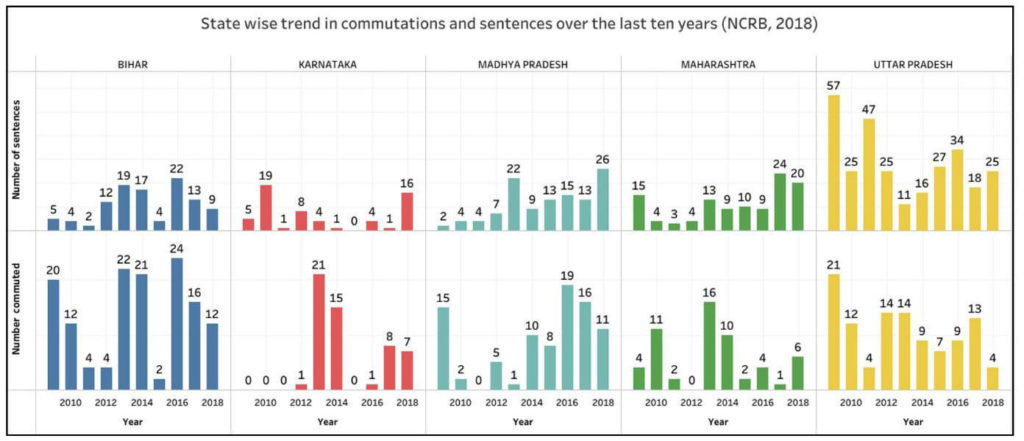
NCRB data does not give the actual picture
NCRB reports the numbers related to death penalty without stating the stage of the case. These figures may be that of sentences given by trial court or that which has been upheld by High Court or those cases in which the mercy petitions are pending. The number of convicts who may have filed mercy petitions is also unknown. Hence it may be useful if NCRB categorises these numbers based on the stage of the case.
Data shows how execution in India is very slow
As the data reveals, there is a huge gap between the number of people sentenced to death and the number of executions that actually take place. This can be attributed to the long delay in trials, appeals and executive clemency.
In the Bachan Singh Vs. State of Punjab case in 1982, the Supreme Court stated that capital punishment was to be given only in the ‘rarest of rare’ cases. The constitutionality of death penalty was upheld by the SC in this case. The doctrine was aimed to reduce ambiguity in the kind of cases which called for death penalty. Both aggravating circumstances (why punishment should be severe) and mitigating circumstances (why punishment has to lessen) were to be considered.
In India, death penalty is generally awarded in crimes related to rape, murder, terrorism and atrocities towards Scheduled Castes and Scheduled Tribes. The Law Commission of India, in its report on death penalty in 2015, stated that there are 12 crimes under IPC and 22 other laws which prescribe death penalty.
The Commission had also recommended that the death penalty should be abolished in all cases except in terrorism-related crimes and waging war. However, no action has been taken in this respect till now despite global efforts to abolish the death penalty. The government amended the POCSO Act in 2019 so as to grant death penalty to those who indulge in aggravated sexual assault against children.
Featured Image: Death Penalties in India


